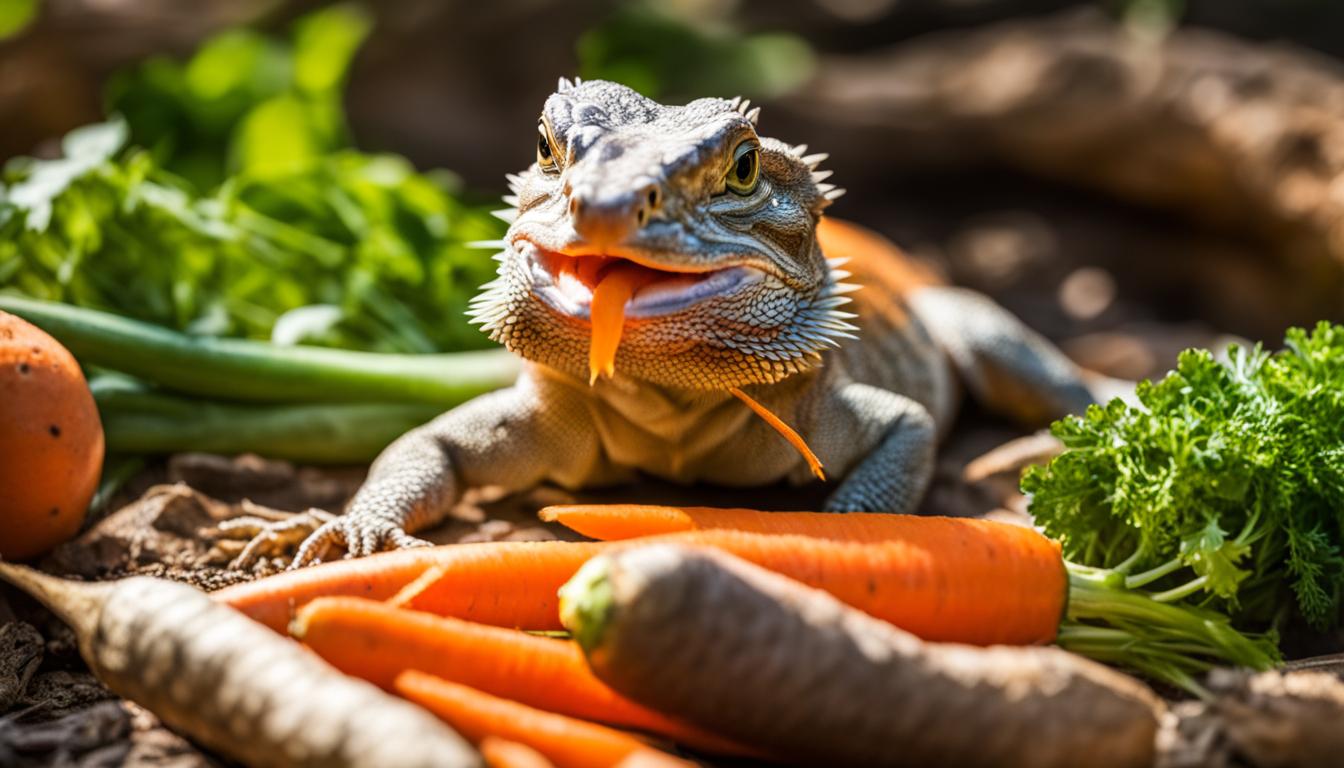Are you a proud owner of a bearded dragon looking for nutritious food options? Look no further than carrots! In this comprehensive guide, we will explore the benefits and considerations of feeding carrots to your bearded dragon, along with essential tips to ensure their health and well-being.
Can bearded dragons eat carrots? Absolutely! Carrots are a great addition to their diet, providing essential nutrients like Vitamin A, beta carotene, and fiber. These nutrients promote healthy skin, a strong immune system, good vision, and aid in digestion. However, it’s important to note that carrots should not be the only vegetable in their diet due to their low calcium content and high vitamin A levels, which can lead to vitamin A toxicity.
You can offer carrots to your bearded dragon once or twice a week as part of their regular food rotation. Carrots come in different colors and can be served raw or cooked, depending on your pet’s preference. However, be cautious when feeding baby carrots as they may contain preservatives. Carrot tops can be given occasionally as a treat but should not be fed in excess due to their oxalate content, which can affect calcium absorption. To ensure easy consumption, wash and grate the carrots before serving them to your bearded dragon.
Key Takeaways:
- Carrots are a nutritious addition to a bearded dragon’s diet, providing Vitamin A, beta carotene, and fiber.
- They should be offered once or twice a week and not as a staple vegetable.
- Caution should be exercised when feeding baby carrots, as they may contain preservatives.
- Carrot tops can be given occasionally, but their consumption should be limited.
- Preparing carrots by washing and grating them ensures easy consumption by bearded dragons.
Can Bearded Dragons Have Carrots as a Staple?
While carrots are a nutritious addition to a bearded dragon’s diet, they should not be given as a staple vegetable. Although they contain beneficial nutrients like Vitamin A and fiber, carrots have low calcium content and high levels of vitamin A. Bearded dragons require a balanced calcium-to-phosphorus ratio to maintain healthy bones and overall well-being. Feeding carrots regularly as a staple can disrupt this balance and potentially lead to metabolic bone disease.
Additionally, bearded dragons are susceptible to vitamin A toxicity, and the high vitamin A levels in carrots can contribute to this condition. Vitamin A toxicity can lead to a range of health issues and should be avoided.
To ensure a well-rounded and balanced diet, it is important to include a variety of vegetables in a bearded dragon’s feeding routine. This will provide the necessary nutrients without the potential risks associated with feeding carrots as a staple vegetable.
Risks of Feeding Carrots to Bearded Dragons
Feeding carrots as a staple vegetable comes with certain risks for bearded dragons:
- Low calcium content: Carrots have low levels of calcium, which is crucial for the development and maintenance of strong bones in bearded dragons.
- High vitamin A levels: Bearded dragons are prone to vitamin A toxicity, and feeding carrots regularly can contribute to excessive vitamin A intake.
- Imbalanced calcium-to-phosphorus ratio: Carrots can disrupt the delicate balance between calcium and phosphorus in a bearded dragon’s diet, potentially leading to metabolic bone disease.
While carrots provide some nutritional benefits, it is important to feed them in moderation and prioritize other vegetables that better align with a bearded dragon’s dietary requirements.
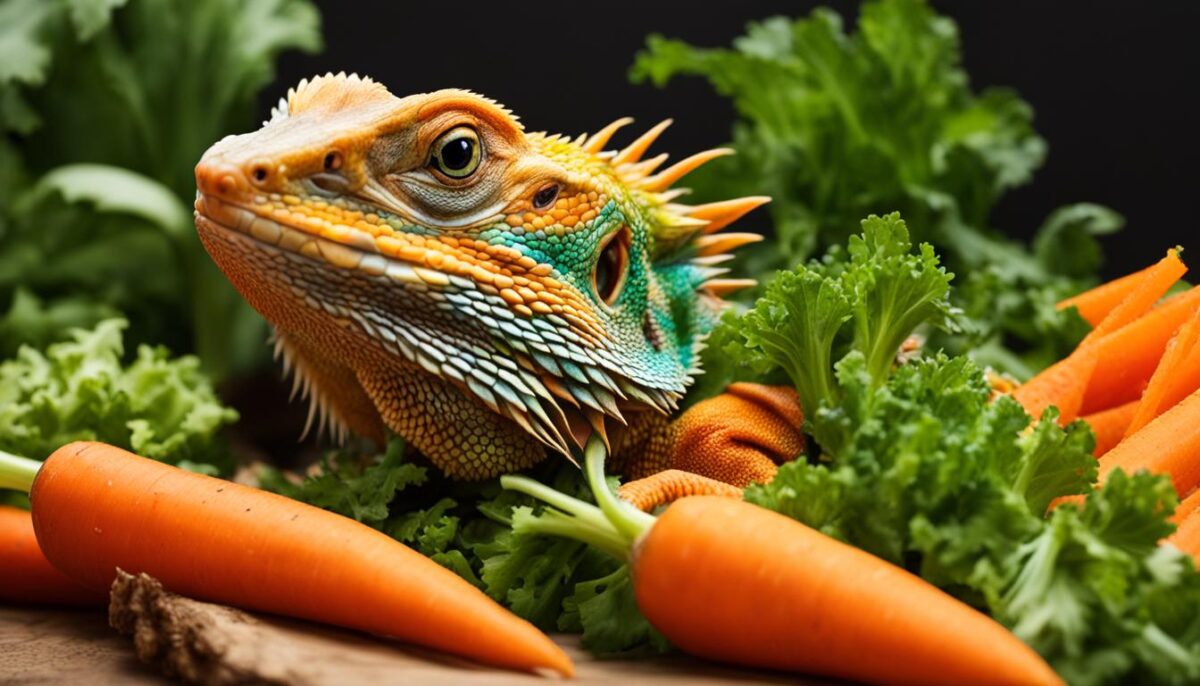
Note: Be sure to consult with a reptile veterinarian for specific dietary recommendations for your bearded dragon.
| Benefits of Feeding Carrots to Bearded Dragons | Cons of Feeding Carrots to Bearded Dragons |
|---|---|
|
|
Do Carrots Cause Vitamin A Toxicity in Bearded Dragons?
Carrots, on their own, are unlikely to cause vitamin A toxicity in bearded dragons. However, if a bearded dragon is already receiving vitamin A or beta carotene supplements, or any multivitamin containing vitamin A, feeding them carrots along with these supplements can push the vitamin A levels over the recommended limit and contribute to toxicity.
Symptoms of vitamin A toxicity in bearded dragons include swelling, decreased energy, weight loss, and dehydration. If any of these symptoms are observed, it is important to consult a veterinarian immediately.
Bearded dragons have specific dietary requirements, and balancing their vitamin A intake is crucial. While carrots contain vitamin A, they should be fed in moderation and not used as the primary source of this nutrient. Providing a varied and balanced diet is essential for the overall health and well-being of bearded dragons.
“Feeding excessive amounts of vitamin A can lead to hypervitaminosis A or vitamin A toxicity, causing various health issues in bearded dragons. It’s important to understand the risks associated with feeding carrots and other high-vitamin A foods to these reptiles.” – Dr. Michelle Anderson, Veterinarian
The Importance of Balanced Nutrition
Bearded dragons rely on a balanced diet to meet their nutritional needs. While carrots may provide certain essential nutrients, they should be part of a varied menu that includes other vegetables and appropriate protein sources. Consult with a reptile veterinarian or nutritionist to ensure your bearded dragon’s diet meets their specific requirements.
Preventing Vitamin A Toxicity
To avoid vitamin A toxicity, it’s crucial to avoid giving bearded dragons excessive amounts of vitamin A supplements or feeding them too many high-vitamin A foods, such as carrots. If your bearded dragon requires vitamin A supplementation, consult with a veterinarian to determine the appropriate dosage and frequency of administration.
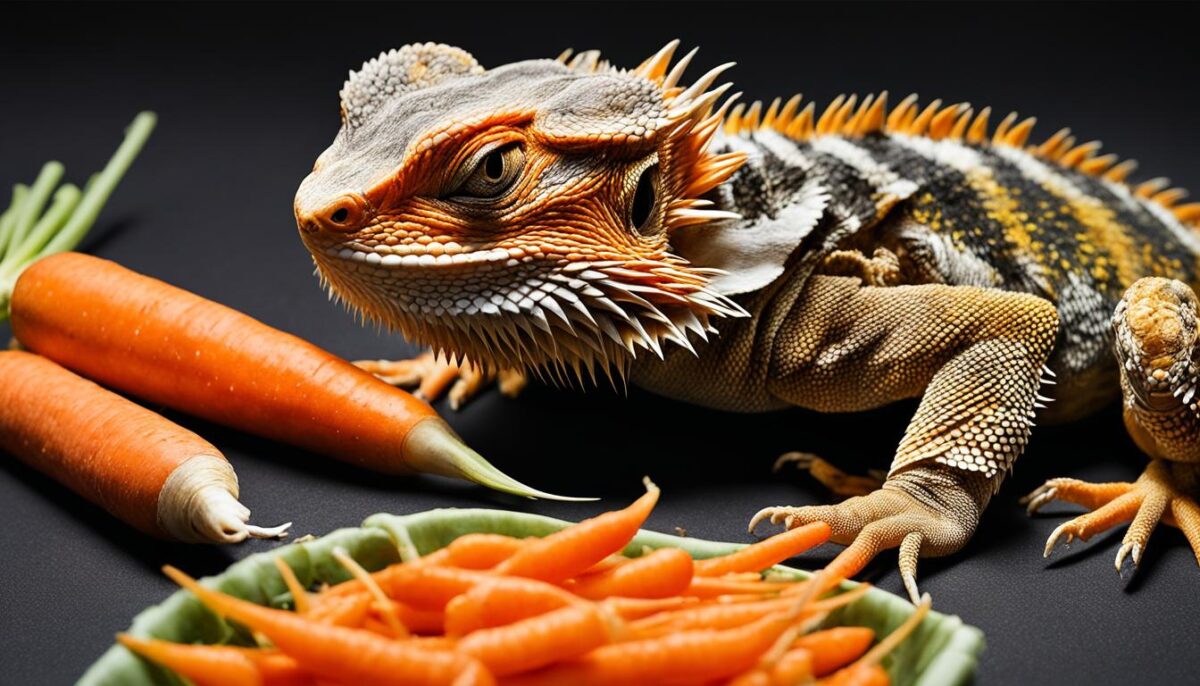
| Vitamin A Sources | Dietary Recommendation |
|---|---|
| Carrots | Feed in moderation, no more than once or twice a week |
| Vitamin A Supplements | Administer only if prescribed by a veterinarian and follow dosage instructions closely |
| Other High-Vitamin A Foods | Avoid feeding in excess and ensure a balanced diet |
While bearded dragons can enjoy the occasional carrot, it’s essential to monitor their vitamin A intake to prevent toxicity. A well-balanced diet that includes a variety of vegetables and appropriate supplementation, if necessary, will ensure your bearded dragon remains healthy and happy.
Can Bearded Dragons Eat All Kinds of Carrots?
Bearded dragons can enjoy a variety of carrots, including white, yellow, purple, and orange varieties. Regardless of their color, carrots offer similar nutritional benefits to these reptiles. While all types of carrots are safe for bearded dragons, it’s important to exercise caution when it comes to baby carrots as they may contain harmful preservatives. To ensure the health of your bearded dragon, it’s recommended to thoroughly wash baby carrots and opt for organic options when available.
Carrots can be served either raw or cooked, although it’s worth noting that cooking can cause some nutrient loss. If you choose to cook carrots for your bearded dragon, it’s best to avoid adding any oils or salt. Cooked carrots should be boiled in clean water and then cooled before serving. Remember to slice them into smaller pieces to make them easier for your pet to chew and digest.
Bearded dragons also enjoy an occasional treat of carrot tops. However, since carrot tops contain oxalates that can interfere with calcium absorption, their consumption should be limited.
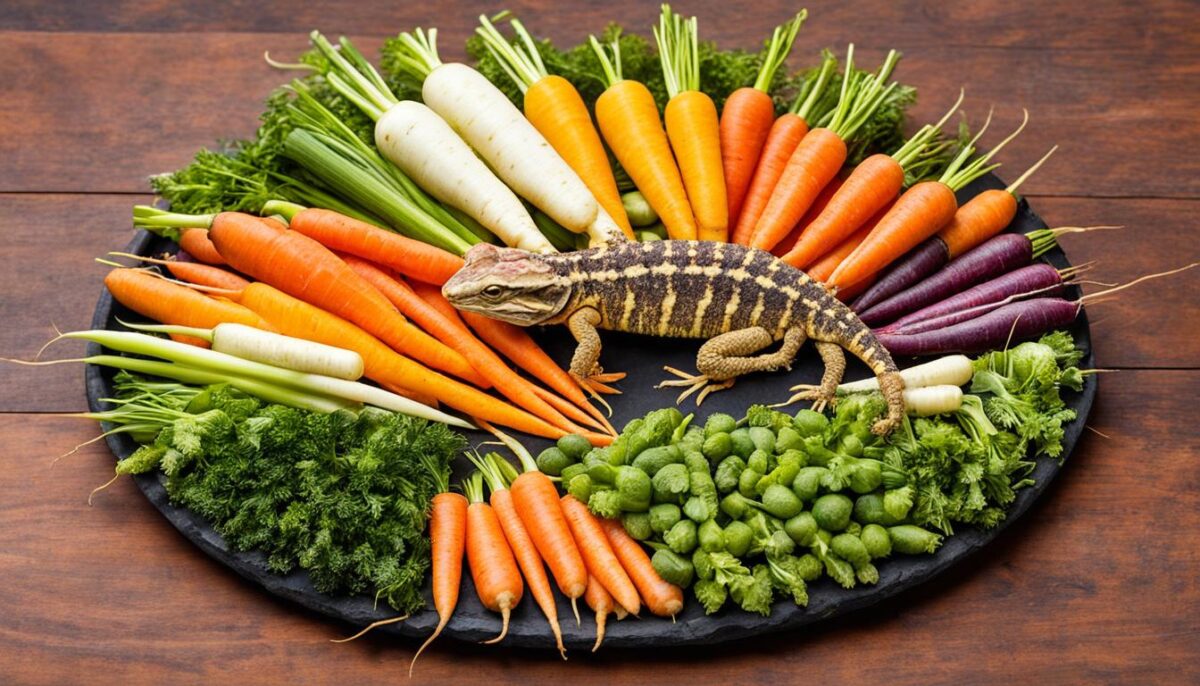
Types of Carrots Suitable for Bearded Dragons
When it comes to feeding your bearded dragon carrots, you have various options at your disposal. Whether it’s the traditional orange variety or the less common white, yellow, or purple carrots, all are suitable for these reptiles. While the colors may differ, the nutritional properties and benefits remain consistent across carrot types.
Baby Carrots and Bearded Dragons
“It’s essential to exercise caution when feeding baby carrots to bearded dragons.”
Baby carrots can be given to bearded dragons, but it’s important to be mindful of potential preservatives. Thoroughly wash baby carrots to ensure they are clean and free from any harmful substances. If possible, opt for organic baby carrots to further minimize the risk of additives or pesticides.
Cooking Carrots for Bearded Dragons
While bearded dragons can consume both raw and cooked carrots, it’s worth noting that some nutrients may be lost during the cooking process. When cooking carrots for your pet, ensure they are boiled in clean water without any added oil or salt. Allow the cooked carrots to cool before serving to your bearded dragon. Remember to slice the carrots into smaller, manageable pieces to facilitate easy consumption and digestion.
Carrot Tops as an Occasional Treat
Carrot tops can be offered to your bearded dragon as an occasional treat. However, due to the presence of oxalates that can interfere with calcium absorption, the consumption of carrot tops should be limited. Treat them as a special surprise for your bearded dragon every now and then.
How Can Bearded Dragons Eat Carrots?
When it comes to feeding carrots to bearded dragons, proper preparation is key to ensure their optimal consumption. There are two main methods of serving carrots to your scaly friend: raw and cooked.
Feeding Raw Carrots
To feed raw carrots to bearded dragons, start by thoroughly scrubbing the carrots to remove any dirt or impurities. Once cleaned, you can grate the carrots into small, manageable shavings that are easy for your dragon to eat. This allows them to chew and digest the carrots effectively.
Raw carrots can be served on their own as a tasty treat or mixed with other vegetables to create a nutritious salad. Incorporating a variety of vegetables in their diet ensures they receive a balanced array of nutrients.
Feeding Cooked Carrots
Cooked carrots are a softer and more palatable option for bearded dragons, especially for those with dental or chewing difficulties. To prepare cooked carrots, start by slicing them into smaller pieces for easier consumption.
Boil the sliced carrots in clean water without any added oil or salt. This method helps retain the nutritional value of the carrots while making them easier to chew and digest. Once cooked, allow the carrots to cool down before serving them to your bearded dragon.
When serving cooked carrots, you can mix them with other vegetables to provide a variety of flavors and textures. To ensure a balanced diet, consider topping the vegetables with a calcium supplement to maintain the proper calcium-to-phosphorus ratios necessary for your dragon’s health.
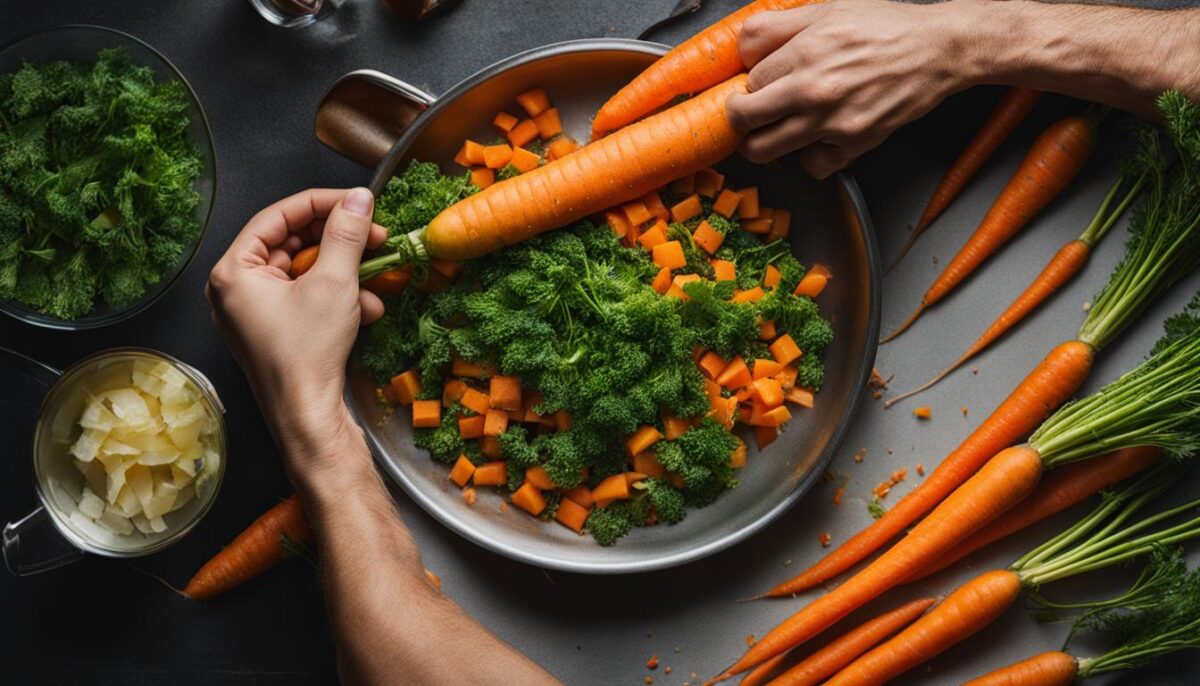
By offering both raw and cooked carrots, you can provide bearded dragons with a nutritious and delicious addition to their diet. Adjust the serving size based on your dragon’s age, size, and overall dietary needs, incorporating carrots no more than once or twice a week as part of their regular vegetable intake.
| Feeding Method | Preparation | Benefits |
|---|---|---|
| Raw Carrots | Thoroughly scrub and grate carrots into small shavings. |
|
| Cooked Carrots | Slice carrots into smaller pieces and boil in clean water. |
|
Remember to consult with a reptile veterinarian for specific guidance on your bearded dragon’s dietary needs and to ensure their overall health and well-being.
The Benefits of Adding Carrots to Their Diet
Adding carrots to a bearded dragon’s diet can provide several benefits. Carrots contain Vitamin A and beta carotene, which promote healthy skin, a strong immune system, and good vision in bearded dragons. They also offer dietary fiber, which aids in digestion and helps bearded dragons process the exoskeletons of insects. Carrots have a low sugar content compared to many fruits and vegetables, making them a suitable low-sugar treat for bearded dragons. It is important to feed carrots in moderation and ensure a balanced overall diet for optimal health.
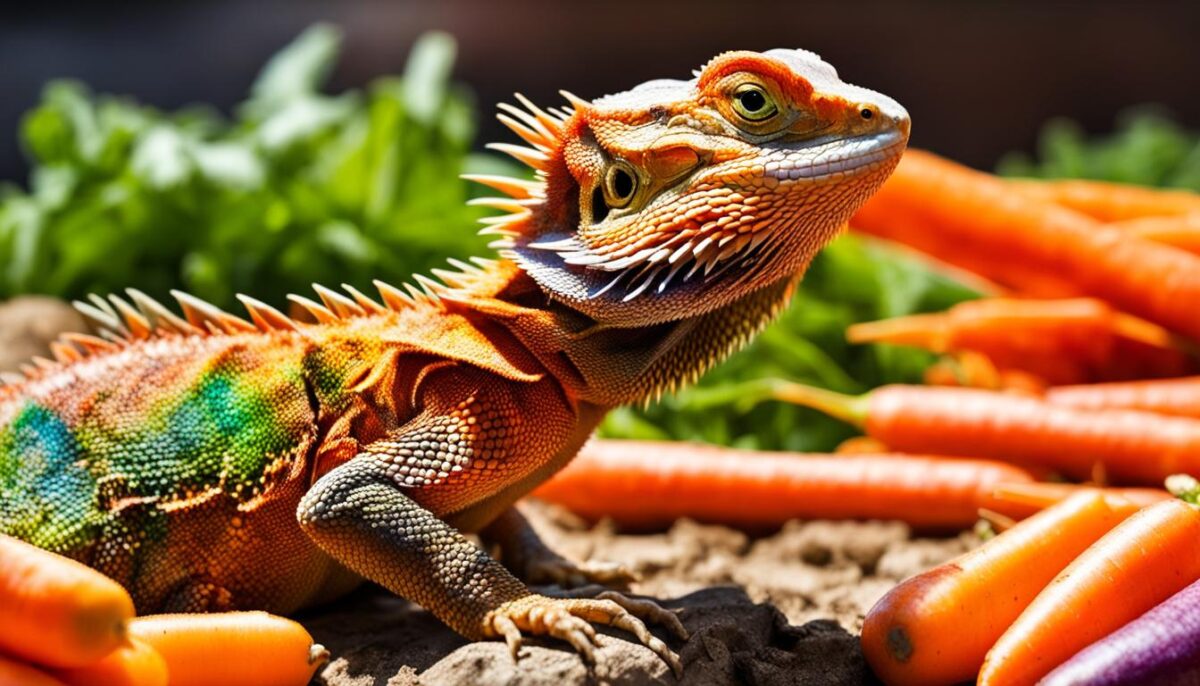
| Benefits of Feeding Carrots to Bearded Dragons |
|---|
| Promotes healthy skin |
| Strengthens the immune system |
| Supports good vision |
| Aids in digestion |
| Assists in processing insect exoskeletons |
| Low sugar content |
Cons of Feeding Bearded Dragons Carrots
While carrots can provide certain nutritional benefits to bearded dragons, it’s important to be aware of the potential risks associated with feeding them in excess. Feeding carrots to bearded dragons can lead to Vitamin A toxicity and an imbalanced calcium-to-phosphorus ratio, both of which can have negative effects on their health.
Vitamin A Toxicity: Carrots, especially those with orange flesh, contain high levels of Vitamin A. While Vitamin A is essential for bearded dragons, excessive intake can lead to toxicity. Symptoms of Vitamin A toxicity in bearded dragons may include swelling, decreased energy, weight loss, and dehydration. It’s important to feed carrots in moderation and ensure they are not given alongside Vitamin A supplements or other multivitamins containing high levels of Vitamin A.
Imbalanced Calcium-to-Phosphorus Ratio: Carrots have a low calcium content and imbalanced calcium-to-phosphorus ratio. Bearded dragons require a balanced calcium-to-phosphorus ratio to maintain healthy bones and overall immune system function. Feeding carrots regularly can disrupt this balance and increase the risk of developing metabolic bone disease. It’s crucial to provide a balanced variety of vegetables alongside other calcium-rich foods to maintain proper nutrition.
Presence of Oxalates: Carrots, especially carrot tops, contain oxalates that can interfere with calcium absorption. If consumed excessively, these oxalates can accumulation in the body and cause health issues for bearded dragons. It’s important to limit the consumption of carrot tops and provide other calcium-rich vegetables to ensure proper calcium absorption.
When offering carrots to bearded dragons, moderation is key. Providing a balanced diet that includes a variety of vegetables with appropriate calcium levels is essential for their overall health and well-being.
Nutritional Comparison of Carrots and Calcium-Rich Vegetables
| Nutrient | Carrots (per 100g) | Spinach (per 100g) | Kale (per 100g) | Collard Greens (per 100g) |
|---|---|---|---|---|
| Calcium (mg) | 33 | 72 | 254 | 232 |
| Phosphorus (mg) | 35 | 49 | 55 | 35 |
| Calcium-to-Phosphorus Ratio | 0.94:1 | 1.47:1 | 4.61:1 | 6.62:1 |
Feeding carrots to bearded dragons should be done in moderation, considering the potential risks associated with high Vitamin A levels and imbalanced calcium-to-phosphorus ratios. A balanced diet that includes other calcium-rich vegetables alongside carrots is crucial for maintaining optimal health in bearded dragons.
Conclusion
In this bearded dragon carrot feeding guide, we have learned that carrots can be a nutritious addition to a bearded dragon’s diet. They provide essential nutrients like Vitamin A and fiber, which promote healthy skin, a strong immune system, and good vision in these reptiles. However, it is important to feed carrots in moderation and not as a staple vegetable due to their low calcium content and high levels of vitamin A.
Bearded dragons can enjoy carrots once or twice a week, alongside a balanced and varied diet that includes other vegetables and protein sources. When serving carrots, it is essential to wash and grate them for easy consumption. While carrots can be served raw or cooked, cooking them may result in some nutrient loss.
When feeding bearded dragons carrots, it is crucial to be mindful of potential preservatives in baby carrots. Additionally, carrot tops can be given occasionally but should not be fed in excess due to their oxalate content. By following these tips for feeding bearded dragons carrots and incorporating a diverse range of vegetables, you can ensure the optimal health and well-being of your bearded dragon.
FAQ
Can bearded dragons eat carrots?
Yes, bearded dragons can eat carrots once or twice a week as part of their regular diet.
Why shouldn’t carrots be given as a staple vegetable in a bearded dragon’s diet?
Carrots should not be given as a staple vegetable in a bearded dragon’s diet due to their low calcium content and high levels of vitamin A.
Do carrots cause vitamin A toxicity in bearded dragons?
Carrots, on their own, are unlikely to cause vitamin A toxicity in bearded dragons. However, if a bearded dragon is already receiving vitamin A supplements, feeding them carrots along with these supplements can contribute to toxicity.
Can bearded dragons eat all kinds of carrots?
Bearded dragons can eat all kinds of carrots, including white, yellow, purple, and orange varieties.
How should I prepare carrots for bearded dragons?
Raw carrots should be thoroughly scrubbed and grated into manageable shavings. Cooked carrots should be boiled in clean water, cooled, and sliced into smaller pieces.
What are the benefits of adding carrots to a bearded dragon’s diet?
Carrots provide essential nutrients like Vitamin A and fiber, promoting healthy skin, a strong immune system, and good vision in bearded dragons. They also offer dietary fiber, aiding in digestion.
Are there any cons to feeding bearded dragons carrots?
Feeding carrots in excess can contribute to vitamin A toxicity, imbalanced calcium-to-phosphorus ratios, and the accumulation of oxalates in bearded dragons.
What is the conclusion for feeding bearded dragons carrots?
Bearded dragons can eat carrots once or twice a week as part of their regular diet. Carrots provide essential nutrients but should not be given as a staple vegetable. A balanced and varied diet is crucial for optimal health.

